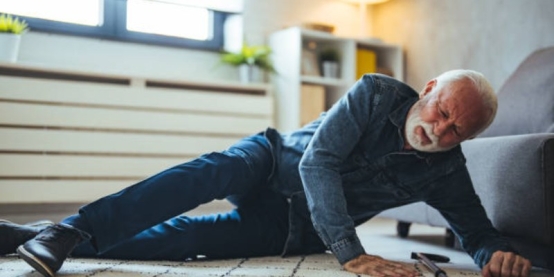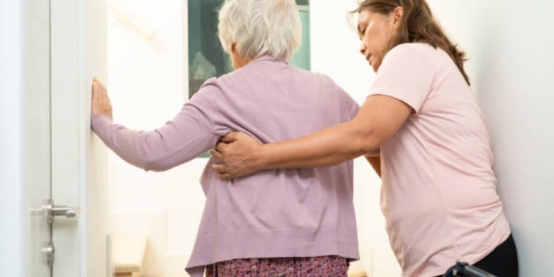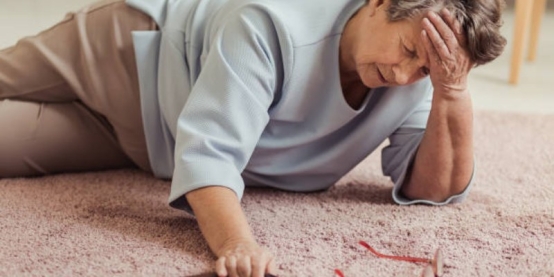Effective Fall Prevention Strategies for Seniors at Home
Many seniors wish to remain in their own homes as they age. But the truth is that the house can be one of the most dangerous places if no one pays attention to safety. A small slip in the bathroom or on the stairs can cause serious injuries. Falls are one of the main reasons seniors visit the emergency room every year.
Common Causes of Falls in Seniors
It is not always just bad luck when a senior falls. There are many reasons why it happens. Weak muscles, poor eyesight, low balance, and unsafe home setups are common causes. Sometimes, medicines can cause people to feel dizzy or sleepy when these factors accumulate; the likelihood of falling increases significantly.

Keep the House Clear and Bright
One big mistake families make is leaving clutter around the house. A shoe here, a bag there, or an old rug can pose a danger to older people. To reduce this risk, floors must be kept clear at all times. Small items, loose wires, or boxes on the floor should be put away or moved out of walkways.
Lighting is another aspect that is often overlooked. Poor lighting in hallways, stairs, and bedrooms increases the chance of tripping. Good lighting helps seniors see better and move safely. Install bright bulbs and put night lights in bedrooms and bathrooms. Motion-sensor lights can also help seniors navigate at night without having to search for switches.
Use Safe Flooring and Fix Hazards
Loose rugs and slippery floors can cause a senior to lose their balance in an instant. Remove rugs that slide easily, or use double-sided tape to keep them in place. Bathroom floors should have slip-resistant mats. For areas like the kitchen or entryway, using non-slip tiles or adding grip strips can lower the chance of accidents.
Sometimes, minor home repairs can make a big difference. Repair broken tiles, uneven steps, or loose floorboards immediately. For staircases, ensure the handrails are sturdy and extend the full length of the stairs. A second handrail on the other side can also add more support.
Install Helpful Tools Around the House
Many simple tools can make a house safer for seniors. Grab bars in the bathroom are very important. These bars help seniors get up from the toilet or steady themselves while showering. Choose bars that can hold weight firmly and install them in the right spots.
For seniors who struggle to get in and out of bed, bed rails can assist. In the kitchen, arrange items on lower shelves so there is no need to climb or stretch too far. Sturdy chairs with arms also help seniors get up and sit down safely.

Pay Attention to Proper Footwear
Wearing the right shoes at home is another easy way to prevent falls. Some people think slippers are fine, but many slippers slide too much on smooth floors. Seniors should wear shoes with non-slip soles and that fit well. Avoid shoes with high heels or loose sandals that can trip someone up.
Shoes should always be comfortable. If they are too tight, they can cause pain, which makes walking more difficult. Supportive shoes give better balance and help older people feel safer when moving around.
Stay Active to Build Strength and Balance
Falls do not only happen because of what is on the floor. Weak muscles and stiff joints can also cause trouble. Seniors should engage in light exercises regularly to maintain their strength. Simple activities, such as walking, gentle stretches, or chair exercises, can help build strength.
Balance exercises are also important. Programs like Tai Chi are recognised for their ability to improve balance in older adults. Always talk to a doctor before starting any new exercise plan. Working with a physical therapist can help seniors identify the best exercises tailored to their specific needs. According to the Centres for Disease Control and Prevention, staying active helps reduce the risk of falling.
Manage Medications and Regular Checkups
Sometimes, the medicine seniors take causes dizziness or tiredness. This side effect can lead to a fall. Seniors need to discuss their medications with their doctor. Doctors can adjust the dose or switch to a safer option if necessary.
Eye health is another big part of fall prevention. Poor vision makes it harder to see obstacles. Seniors should have their eyes checked at least once a year and update their glasses if needed. Good eyesight helps spot dangers before they cause harm.

Plan for Emergencies
Even with the best planning, falls can still happen. Families should prepare for emergencies. Seniors should carry a phone or wear a medical alert device so they can call for help fast. Some devices detect falls and automatically send an alert if the person is unable to speak or move.
Keep significant phone numbers close by and easily accessible. Ensure seniors are proficient in using their phones and devices effectively. Prompt assistance after a fall can help prevent minor injuries from becoming more severe.
Get Support from Family and Community
Many seniors are reluctant to ask for help, but staying safe sometimes requires extra support. Family members should visit frequently and assist with tasks that may be too challenging for older individuals to perform alone. Simple tasks, such as changing light bulbs, fixing minor repairs, or moving heavy items, should not be left to seniors.
Some local groups and healthcare services offer home safety checks. These checks help find hidden dangers and suggest better ways to keep the home safe. The National Institute on Ageing has helpful information for families to plan and stay safe.
Stay Ahead of Falls
Falls at home do not have to be a part of the ageing process. Simple changes and good habits can protect seniors and bring peace of mind to their loved ones. Keeping floors clear, adding good lights, wearing safe shoes, and doing small exercises all work together to lower the risk. Talking to doctors, checking eyes, and planning for emergencies help even more.
A safe home keeps seniors independent and healthy. Everyone deserves to feel secure in their own home. Families should work together to make sure the house stays that way.